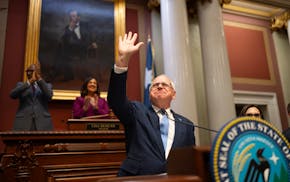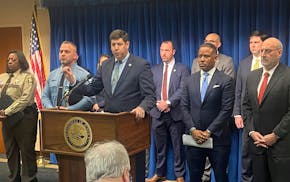Gavin Browning and three roommates moved into a house near the University of Minnesota. Sixteen days later, his landlord said they could re-sign their lease if they wanted, but the company was already scheduling showings to tenants for the next school year.
"At that point I didn't even know where I put the pots and pans," said Browning, a junior majoring in chemical engineering. "It was kind of stressful ... 17 days is a pretty tight timeframe to decide where you're going to live for the next two years."
It's a scene that plays out across Como, Dinkytown and the Marcy-Holmes neighborhoods near the U each year, forcing Minneapolis college students to make tough housing choices fast — or risk not having a place to live the next year.
A new state law that took effect this year aims to curb the aggressive timeline by prohibiting landlords from requiring tenants to renew leases until six months before the current lease expires. But the law lacks any penalty for landlords and it's unclear how interpretations of the new statute will hold up in court.
"The victory ... is that landlords can't force tenants to make choices about their future ... an unreasonable time in advance," said Rachael Sterling, an attorney for HOME Line, a Twin Cities tenants' rights organization that operates a hotline. "You can certainly ask your tenants to renew the lease but you can't do it until you're six months out."
Advocates for the new law, including Student Legal Service at the U, say it protects tenants, most of them young adults, who may be signing their first-ever lease. They may see signing leases early in the school year as normal practice because they have never rented elsewhere. And they're unlikely to ask for help if their rights are violated.
Cecil Smith, CEO of the Minnesota Multi Housing Association, a trade group for property owners and operators, said he made suggestions on language for the bill and has held education sessions on the new law for his members.
Mark Freund, who owns 10 properties all near the U, said he begins contacting tenants as early as October because of high demand, with some prospective renters inquiring about a unit a year or more out. But, he said, he never compels or coerces current tenants to re-sign their leases.
"All of this early leasing is 100% tenant driven," he said. "I'm not pushing it; I don't have an active ad out there."
Browning and his roommates ended up re-signing their lease in the Como area for next year because they were OK with the place and rent was low. Sterling said being asked to re-sign a lease that early was against the new statute. The Miles Group, Browning's landlord, did not return a call from the Minnesota Star Tribune for comment.
A competitive market?
The new law went into effect Jan. 1 and affected the leases that were signed on or after that date. A slightly amended version will take effect Jan. 1, 2025.
Sen. Zaynab Mohamed, DFL-Minneapolis, said she worked to pass the legislation because it protects students, who are inexperienced renters.
"Students came up with this legislation," she said. "What they're saying is, we just need some time."
The area surrounding the U's Twin Cities campus has long been a competitive housing market, as students and other renters jockey for spots in several neighborhoods that are conveniently located near the university and transit and walkable to amenities.
Advocates for the new law and students themselves say the advanced timelines for renting can hurt students, who feel like they must make rash decisions about who to live with, where to live and how much to spend.
Claudia Staut, a junior who lives in a house in the Como neighborhood with seven roommates this year, said her freshman year she didn't start looking for housing until January. She ended up living with two roommates the next year and paying nearly $1,000 a month, including utilities, to live in a new building.
"It was very stressful," she said. "It felt like I didn't have many options to look at."
This year, Staut's landlord started showing their house to prospective tenants in November, also mentioning that if tenants wanted to stay, they would have to re-sign by a certain date. Most of her roommates signed a new lease while Staut said she'll live elsewhere.
Sterling said there's a "strong argument" that the property owner, who Staut declined to name, violated the intent of the new law. But there's room for interpretation on either side, she added.
Shana Tomenes, an attorney for Student Legal Services at the U, said she believes that while there was once a housing shortage in the area, a building boom in the last decade or so — and the debut of two large complexes in the last two years — has resulted in more housing than students. But the messaging to students is the same as before: They have to act early to get the best rates.
Many of the landlords in these neighborhoods are large, corporate and located out of state, she said, with a portfolio of properties in various college towns.
"I just don't think the current timeline benefits landlords or students," Tomenes said. "I think what's driving it is tradition more than anything else."
In the past, some students were even forced to forfeit security deposits if they didn't tell their landlord they were renewing by a certain date.
Tomenes said the new law aims to "even out some of the power imbalance" between tenants and landlords. She interprets it to say that landlords "can always ask [about lease renewal] but they can't say 'Tell me by Sept. 15 or I won't rent to you.'"
Will the new law solve the problem?
Sterling, from HOME Line, said the new law allows students to ignore any communication from their landlord asking them about renewal sooner than six months before their lease expires. Students also should not be penalized — such as their landlord refusing to re-rent to them — for not responding to queries.
But the new law can be ambiguous, too, Sterling said, adding that "the intent is fairly clear" but the wording is somewhat confusing. She also said there's no penalty if a landlord violates the statute.
Tomenes, from the U, also said it's unclear how the statute would hold up in court, and it might take a while for someone to bring a case forward to test it.
Freund also noted that Minnesota is a free will state, so landlords aren't obligated to renew a current tenant's lease.
Matt Hernandez, 28, said he and his two roommates got an email from Freund about showings to potential tenants not long after moving into an apartment in the Marcy-Holmes neighborhood this fall.
"It was so soon," he said, adding that they actually would have liked to stay in the apartment for another year.
Hernandez said he believes Freund is breaking the law because renewal and showings aren't supposed to occur until six months from the lease's end.
"He started showing like a month into us living here," he said. "To us that's a pretty clear violation of the law."
Freund said his attorney has reviewed his policies and he's following the law despite setting up showings this fall. He said if residents don't know whether they'll renew their lease, he has to arrange showings "to address the market and the demand."
"I don't know how else I can be respectful to my tenants," he said, "and try not to lose my business."

As Rep. Angie Craig takes her town halls to greater Minnesota, Republican colleagues say she may be violating House ethics rules

Gov. Walz excoriates Trump, offers olive branch to MN Republicans in State of the State speech

Minnesota county commissioner, whose wife wanted him to step down due to cognitive concerns, resigns

Federal jury convicts three Minneapolis 'Highs' gang members of murder, racketeering

